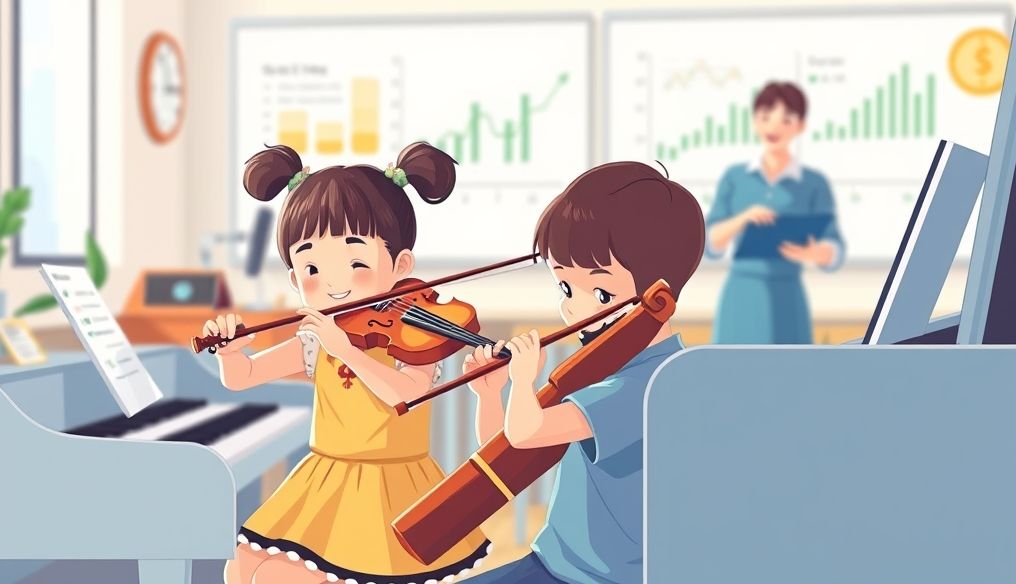Does Mozart's Music Really Make Children Smarter? A Comprehensive Scientific Look
Since the 1990s, the idea that listening to Mozart's music can increase children's intelligence has been widespread, a phenomenon known as the "Mozart effect." But is this belief supported by strong scientific evidence? This article aims to explore this topic in depth, analyze various studies and research, and provide a comprehensive view of the impact of music on children's development.
What is the "Mozart Effect"?
The term "Mozart effect" first appeared in 1993 when the journal "Nature" published a study suggesting that listening to a Mozart sonata (Piano Sonata in D major, K. 448) for 10 minutes led to a temporary improvement in spatial-temporal abilities in college students. These abilities are related to abstract thinking and solving complex problems. Although the effect was temporary and lasted only about 15 minutes, it sparked widespread interest in the media and among the public.
How Did the Idea Spread?
After the study was published, the "Mozart effect" was greatly amplified, and companies began marketing CDs and cassette tapes featuring Mozart's music, claiming that it could make children smarter. This idea spread widely, and parents began to believe that playing Mozart's music for their children would improve their mental and academic abilities.
A Closer Look at Research and Studies
Over the years, many studies and research have been conducted to assess the validity of the "Mozart effect." Some of these studies supported the idea, while others failed to find any conclusive evidence of a real impact on intelligence.
Studies Supporting the "Mozart Effect"
Some studies have indicated that listening to music, including Mozart's music, can improve certain cognitive abilities, such as memory and attention. For example, a study conducted in 2001 found that children who received piano lessons showed an improvement in their spatial-temporal skills compared to children who did not receive any musical instruction.
Studies Refuting the "Mozart Effect"
In contrast, many studies have found no evidence that listening to Mozart's music increases intelligence. In 1999, a group of researchers conducted a meta-analysis of 16 studies on the "Mozart effect" and concluded that the effect, if any, is very small and temporary, and cannot be generalized to all age groups.
Another study published in 2000 compared the effect of listening to Mozart's music to listening to a recorded story and found that both activities led to a temporary improvement in spatial-temporal abilities, suggesting that the effect may be due to enjoying the activity rather than the properties of Mozart's music itself.
What Does Neuroscience Say About Music and the Brain?
Research in the field of neuroscience suggests that music has a profound effect on the brain. Listening to and performing music activates multiple areas of the brain, including those responsible for language, memory, attention, and movement. This increased activity can lead to improvements in these cognitive abilities.
Impact on Neuroplasticity
Neuroplasticity is the brain's ability to change its structure and function in response to new experiences. Research suggests that music can enhance neuroplasticity, making the brain more adaptable and learning-capable. This effect may be particularly beneficial for children, whose brains are still developing.
Music and Memory
Music is closely linked to memory. Listening to a familiar song can evoke strong memories and deep emotions. This association between music and memory may be useful in improving cognitive abilities. For example, a study found that listening to music while studying can help students remember information better.
Music and Children's Skill Development: What Are the Real Benefits?
Regardless of the validity of the "Mozart effect," there are many other benefits of listening to and performing music for children:
- Improved Language Skills: Research suggests that music can help children develop their language skills, such as pronunciation, reading, and writing.
- Enhanced Social and Emotional Skills: Participating in group musical activities, such as singing in a choir or playing in a band, can help children develop their social and emotional skills, such as cooperation, communication, and empathy.
- Increased Creativity and Self-Expression: Music provides children with a means to express themselves in creative ways. Playing a musical instrument or writing songs can help children develop their imagination and ability to think outside the box.
- Improved Attention and Focus: Listening to or performing music requires attention and focus. With practice, children can improve their ability to concentrate on other tasks as well.
How to Integrate Music into Your Child's Life?
There are many ways to integrate music into your child's life, whether through listening to music or performing it:
- Play Music at Home: Play a variety of music at home, including classical music, popular music, and children's music.
- Sing with Your Child: Singing with your child is a great way to spend fun time together and enhance their language and musical skills.
- Encourage Your Child to Play a Musical Instrument: If your child is interested in playing a musical instrument, encourage them to take lessons.
- Take Your Child to Concerts: Taking your child to concerts is a great way to introduce them to different types of music.
- Enroll Your Child in Music Lessons: There are many music lessons available for children of all ages and levels.
Conclusion: Music is Important, But It's Not a "Magic Cure"
In conclusion, although the "Mozart effect" may not be supported by strong scientific evidence, music has many other benefits for children. Listening to and performing music can improve language, social, emotional, and creative skills, as well as attention and focus. Therefore, it is important to integrate music into your child's life, but it is also important to have realistic expectations. Music is not a "magic cure" that will make your child smarter, but it can be a valuable tool for promoting their growth and development.
Additional Tips for Parents
- Choose Music That Your Child Enjoys: The most important thing is to choose music that your child enjoys. If your child does not enjoy the music, they will not get any benefits from it.
- Be a Good Role Model: If you enjoy music, your child is more likely to enjoy it as well.
- Don't Pressure Your Child: Don't pressure your child to listen to music or play a musical instrument if they are not interested in it.
- Make Music Part of Your Daily Routine: Make music part of your daily routine, such as playing music while eating breakfast or before bed.
By integrating music into your child's life in a fun and appropriate way, you can help them reach their full potential and develop a variety of valuable skills.




